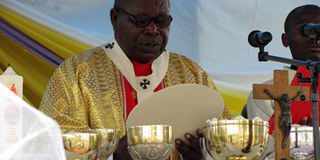Bakyenga’s 25 years as Mbarara lead shepherd

Archbishop Paul K. Bakyenga, celebrates mass during his celebrations to mark 40 years as a priest at Mushanga in 2011. courtesy photo
What you need to know:
Milestone. Today, all roads lead to Nyamitanga, the seat for Mbarara Archdiocese, where the Archbishop will celebrate his silver jubilee as the bishop of Mbarara.
When he was ordained a priest in 1971, Paul Kaamuza Bakyenga, like Pope John Paul I, thought he would serve his calling and retire possibly at rank of a Parish priest. But 44 years later, Archbishop Bakyenga will today celebrate his silver jubilee as the bishop of Mbarara. Archbishop Bakyenga has also since 1999, been the head of the Catholic ecclesiastical province of Mbarara – comprising the dioceses of Kabale, Kasese, Fort Portal and Hoima, at the rank of Archbishop. Today, he is the most senior of the active catholic bishops of Uganda, having served more years as a bishop.
“I never thought I would become a bishop. I never expected the appointment at all. God knows how I came this far. I even read the wrong courses – I did sacred scripture, bishops study church canon law,” Archbishop Bakyenga said during mass with Mbarara Archdiocese Catholic community at Kitante Primary School on May 30. Though he was appointed Bishop on March 6, 1989, the official appointment came out on April 1 the same year.
“Many thought maybe, it was an April 1 fool’s day prank,” Bishop Bakyenga joked.
The celebrations
Today, all roads lead to Nyamitanga, the seat for Mbarara Archdiocese, where Christians and well-wishers are celebrating 25 years of Paul K. Bakyenga as the area bishop. The occasion fell last year but the celebrations were postponed to this year, because the archbishop [Bakyenga] had a foreign engagement in Germany and had discouraged the celebrations until the Papal Nuncio, Archbishop Micheal Blume, insisted that the Christians can celebrate their archbishop’s achievement.
Early Life and background
A fourth born in a family of 10 children of Sipiriano Kaamuza and Maria Gakibayo of Bumbaire, Igara in Bushenyi District, Archbishop Bakyenga was born on June 30, 1944.
He went to Ibaare Primary School, before he joined Ibanda Preparatory Seminary from 1958 to 1960. He attended his preprimary school in the church building at Bweeza, writing on sand and banana leaves.
“My father was not rich, he grew up an orphan, supporting himself. He never went to school. My grandfather was a pagan. He was not baptised. But my mother had longed for a God-fearing man whom she found in my father,” Archbishop Bakyenga said during the interview at his residence in Mbarara. His mother was a potter.
For Archbishop Bakyenga to enroll into a preparatory seminary, his young brother’s primary education had to be sacrificed so that his father could raise enough money for his studies.
The archbishop said he chose to join the seminary because he was inspired by students of Kitabi, a famous seminary in his neighbourhood, which he passed by on his way to Ibaare Primary School.
“It is not that I wanted to be a priest - that never crossed my mind at the time,” he says. He said the Kitabi seminary students were caring, smart and very good at sports.
In 1961, he joined Kitabi Seminary from Ibanda, and then enrolled at Bukalasa seminary in 1965 for A-Level studies but he did not complete. “At Bukalasa, we got stubborn and we were stopped,” he says.
He then tried to join Radio Uganda as a newsreader in the same year but could not raise transport to travel to Kampala in time for the interview and ended up missing out on the opportunity.
He decided to go to Rushoroza Seminary in Kabale and teach. At the end of the, he was paid Shs390, and he gave his father Shs319, who had become a squatter in Ngomanungi, present day Sheema District, to buy land to settle and feed his family.
His father had left the land in Bumbaire, Igara to his young brother.
Archbishop Bakyenga used the remaining Shs71 to buy a watch.
He then enrolled at Kitigondo to study philosophy but abandoned the course two year after. At this point, Bishop John Baptist Kakubi of Mbarara, sent him to study at St Andrews College in Scotland, where he would obtain a degree in Theology. He was ordained a priest on July 11, 1971 at Mushenga parish at the age of 27. Eighteen years later, 45-year-old Bakyenga was appointed bishop.
He has also served as Chaplain of Ntare School in Mbarara, Rector of Kitabi Seminary, and Rector of Ggaba National Seminary from 1985 to 1989, when he was appointed bishop.
On January 2, 1999, Pope John Paul II appointed Bakyenga archbishop at the age of 55.
Reflections
Archbishop Bakyenga says his most trying time as head of church in Mbarara was the March 2000 death of hundreds of Christians at the hands of the Movement for the Restoration of the 10 Commandments headed by Joseph Kibwetere, who were burnt in the Kanungu inferno.
He will also never forget the sad memories brought by the 1993 accident on Mbarara-Ishaka Road, in which 23 students of Kitabi Seminary, who were coming from a football match in Mbarara, perished on the spot.
“I have lost many priests, lay Christians who were close to me and used to advise me. I have also lost two Vicar Generals – Monsignor Edward Baingana-Muntu and Nyabahika. All these have been trying moments,” he says.
At 71 and owing to his seniority, Archbishop Bakyenga, a very talented and humorous preacher is one of the prelates in the catholic church in Uganda who could be the next Cardinal in Uganda.
Achievements
Archbishop Bakyenga has a lot to be proud of. The number of Catholics in the diocese, which covers 10 former Ankole districts, has grown from about 700,000 to more than 1 million today. When he became a bishop, the diocese had 18 parishes but now boasts of 43. The development of the diocese has been so profound that there is a recommendation to give Bushenyi its own independent diocese. “The proposal is there (in Vatican) but for us, we give recommendations, we do not decide,” he said.
Archbishop Bakyenga’s leadership has been particularly strong in education and social services such as health - pioneering the St Joseph’s University in Mbarara, and a specialised hospital for children – The Holy Innocents Children Hospital at Nyamitanga – which treats children up to 12 years. Kitabi Seminary and St Joseph’s Vocational School, remain among the top schools in Uganda under his leadership.




